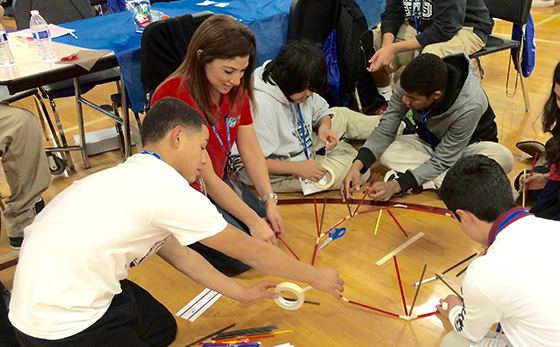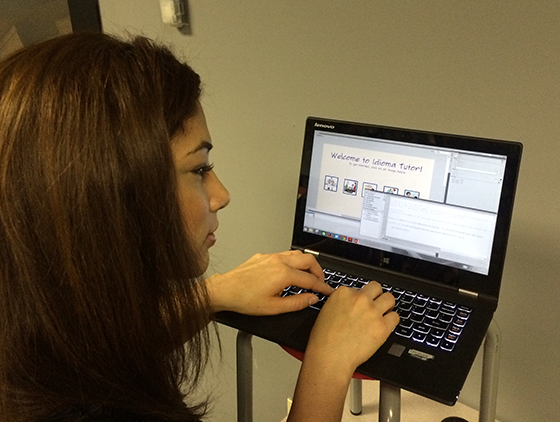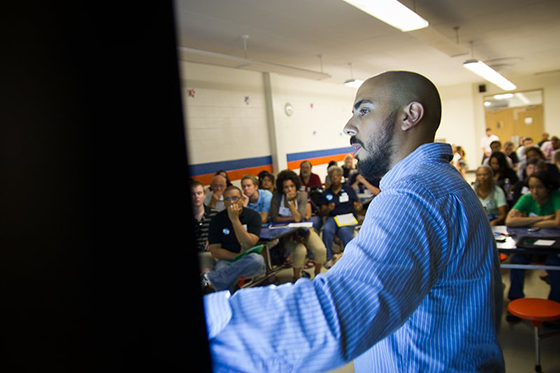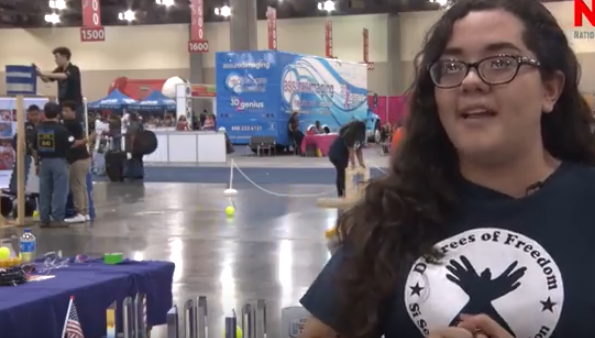Up Close with Two STEM Trailblazers
Meet two NCLR staffers who have pursued their STEM passions
Careers in science, technology, engineering, and math (STEM) are as important as ever. Technology is advancing so rapidly that STEM jobs can’t be filled fast enough. According to the U.S. Congress Joint Economic Committee, between 2010 and 2020 employment in STEM careers will increase by 17 percent. As things stand, there are currently two science and tech jobs for every qualified candidate.
Latinos are going to need the skills required for these fields if we are to truly advance and be competitive in the global economy. Yet while Latinos compose 16 percent of the U.S. population, in 2010 just eight percent of STEM certificates and degrees were awarded to our community. There is certainly a need for Latinos to fill the void in STEM occupations, and NCLR is working vigorously to prepare as many Latino students as we can for STEM careers.
Of course, it helps that NCLR has staff who can speak from personal experience about the value of a STEM career. We are lucky enough to have two STEM trailblazers on our team: Oralia Mijares and Jonathan Marrero. Oralia serves in NCLR’s Texas Regional Office as Operations Manager. Jonathan works in our Washington, DC headquarters as Senior Manager of Digital. We asked them to share their stories and explain how they discovered their aptitude and passion for pursuing a STEM career.
A Chat with Oralia Mijares

NCLR: What specific programs allowed you to pursue your passion?
Mijares: One of my very first exposures to STEM was part of my high school experience. I attended the John Jay Science and Engineering Academy, which was heavily focused on science, engineering, robotics, and mathematics. I vividly remember assembling a robot—back then, we couldn’t program them! The pride and immediate gratification that emerged as a result of contributing to this project was pretty amazing. It was then that I truly understood the power of learning and how applying scientific methods could change our approach to thinking and problem solving. It was alluring.
NCLR: Can you talk about any of the people who provided you with the support you needed to succeed?
Mijares: My programming professor always assured me that there was nothing I could “break.” Through rigorous study, application, and practice, I could “make my applications do whatever I wanted.” I applied this methodology to just about everything I encountered. Knowing that there is a world of resources out there to help us solve everyday problems is encouraging.
 NCLR: What advice do you wish you had received back in high school and would give now?
NCLR: What advice do you wish you had received back in high school and would give now?
Mijares: Being a Latina and a female in technology, you are the two percent. It is imperative that you own that statistic and leave your insecurities at the door. Nothing compares to the excitement of solving a complex problem and utilizing technology to do it—none of this is possible if the thought of being unable to do something consumes your drive. There is equal opportunity for everyone to succeed in STEM, despite your background. If you’re willing to rise to meet the challenge, you can contribute to improving the world around you.
Some advice:
- In the world of technology, there is always a new software or approach to learn. Ground yourself in the syntax and the rest will come easy.
- Surround yourself with likeminded people and, when possible, learn from pioneers. Understand what they did to get to where they are and apply that to your situation. Don’t just sit at the table—contribute! Your ideas are important.
- Make a road map, adopt it, apply it, live it, and most importantly, own it.
- Know what ignites you and use that to light your world.
A Passion for Code
By Jonathan L. Marrero, Senior Manager, Digital, NCLR
Writing code is my passion. I did not realize it was my passion until fairly recently, but I’ve been at it ever since. I absolutely love the challenge and reward that comes from filling a blank slate with lines and lines of code. I only wish I were exposed to coding at a much younger age.
I’ve always had an interest in computers and technology. Growing up, I was the only one in my home who knew how to log into our desktop computer—this was back in the MS-DOS days. I recall spending hours digging through the many setup files and playing with the different programs. The interest in technology stuck with me through high school, though I was never formally introduced to computer science as a field until well into my adult life.
Fast-forward to 2007, when the Internet was growing at an immeasurable rate and social media—or new media, as it was called at the time—was still in its infancy. I was an organizer working in New Jersey. My interest in computers and the Internet was ever-present and my workflow showed it. I used Google Maps to cut turf for walk lists, Excel docs for tracking goals, and Gmail to communicate with my colleagues. It was at this point that I really began to wonder about the inner workings of web applications and how they were made. This was also the point when I started learning my first coding languages: HTML and CSS.
It wasn’t until I joined President Obama’s second campaign for president that I got real exposure to programming and development. I recall walking through the campaign headquarters in Chicago and staring at the computers of the developers on staff. I could tell they were writing some kind of code because it looked similar to HMTL and CSS, but I couldn’t understand any of it. I did, however, think to myself, “This is awesome!” I then realized that those developers were building the applications that were powering the campaign, similar to the developers who created the social media apps that powered my organizing work years before.
 I later transitioned to the role of digital director for the state of Virginia, where I was fortunate to share an office with the state’s data director. In one of the many conversations he and I had, I mentioned that I was interested in developing and writing code, but I had no idea where to start. He gave me a bit of advice that would help me tap into a passion I didn’t know existed: “Try CodeAcademy.com.” I did. I was hooked from the first “Hello, World!” program that I wrote in JavaScript.
I later transitioned to the role of digital director for the state of Virginia, where I was fortunate to share an office with the state’s data director. In one of the many conversations he and I had, I mentioned that I was interested in developing and writing code, but I had no idea where to start. He gave me a bit of advice that would help me tap into a passion I didn’t know existed: “Try CodeAcademy.com.” I did. I was hooked from the first “Hello, World!” program that I wrote in JavaScript.
After spending a couple of hours on Code Academy that evening, I made the commitment to myself that I would learn to code after the campaign. I’m proud to say that I’ve stuck to that commitment. Not only am I currently pursuing my B.S. in computer science, I also write code as a hobby. I’m currently learning PHP with the hope of launching my first web app this summer.
For more information on NCLR’s STEM education programs, or to bring a program to your community, contact NCLR’s STEM Manager, Juliana Ospina Cano, at [email protected]. Follow us on Twitter @NCLRSTEM and on Facebook for the latest news and information on our programs.





